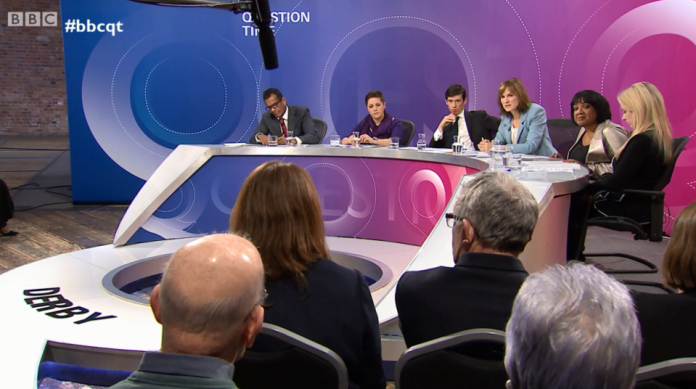The appalling treatment of Diane Abbott on the BBC’s prime politics “debate” show is redolent of a show that has been going down the pan for years.
After years of stagnations under Bullingdon Boy Dimbleby, it was announced that the show was to be presented by Fiona Bruce – a woman no less, perhaps as if that would make it feel fresh or something.
As has been reported across mainstream, social and independent media, Abbott was mocked by the new presenter before the show and constantly interrupted during it. One of Bruce’s interruptions was to correct her with polling facts that were themselves wrong. This is now what passes for “flagship” journalism and scrutiny.
The Labour Party has lodged a formal complaint.
While Abbott’s politics and personal style may not be to everyone’s liking, it seems highly likely that these characteristics provide useful cover and plausible deniability for a great deal of racist and misogynist vitriol in recent years. Few politicians have been more abused. Like her or not, that is unacceptable. But not at the BBC, they have shown they are perfectly happy to fuel the fire.
This sad instance is part of a long term slide in quality on a show where political speakers have long since been over-prepped with talking-points and the audience.
The show conveys a vibe that we (the serfs) are lucky to have the great and the good share their thoughts with us in the first place. While there are numerous audience contributions, they never get a come-back. This encourages them to be sound-bitey and somewhat over the top.
The audience has also famously become a den (or greenhouse) of plants. Several times, contributors have turned out to be party apparatchiks themselves and the BBC have gone to specific lengths to invite fascists such as EDL supporters to take part. Confrontation and entrenched attitudes make for (supposedly) good TV and Twitter flame-wars. In the clumsy and patronising pursuit of “populism”, worthwhile political discourse can quickly go out of the window.
Question Time is arguably worse than nothing, a pompous travesty of debate that too often fails to get beneath the surface to genuine dynamics. Some may call for a make-over, that’s unlikely to happen, and not guaranteed to suffice if it does. Many people have gone off it entirely, perhaps because they are too interested in politics to bother with it.
Stephen Durrant







